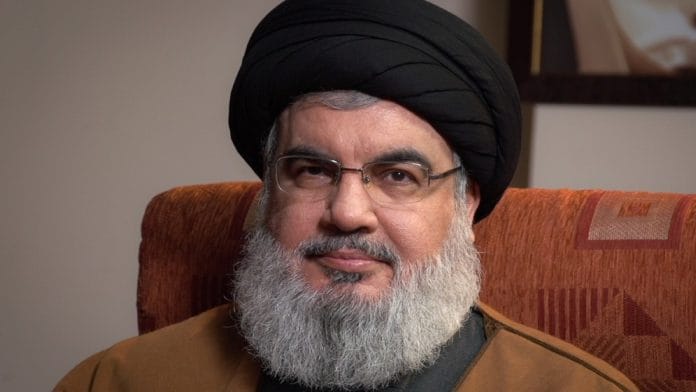New Delhi: Lebanese cleric and secretary-general of Hezbollah Hassan Nasrallah has been declared dead in a strike in Beirut by Israel’s army Saturday, though the militant Shia group is yet to confirm the same.
“Hassan Nasrallah is dead,” Lieutenant Colonel Nadav Shoshani, international spokesperson for the Israel Defense Forces (IDF), wrote on X.
Israel’s attack targeting the chief of one of Iran’s proxies follows last week’s deadly pager and walkie-talkie blasts across Lebanon and Syria, seen as a tactful operation by Israel to endanger communication among Hezbollah’s ranks.
The 17 September pager blasts killed over 32 people, and blinded Iran’s ambassador to Lebanon, Mojtaba Amani. At least 14 were killed as walkie-talkies operated by Hezbollah members exploded the next day.
Nasrallah, 64, had kept out of the public eye for many years, fearing assassination by Israel. His suspected death comes at a time when tensions between Iran-backed Hamas and Israel in war-torn Gaza are spilling over into the region. Hezbollah too is backed by Tehran, with Iran’s Supreme Leader Ali Khamenei saying the Lebanese militant group will be the “victors” against Israel.
The Resistance Front and the Hezbollah Front will be the ultimate victors in this battle.
— Khamenei.ir (@khamenei_ir) September 25, 2024
Nasrullah was viewed as an “even more dangerous incarnation” of al-Qaeda’s Osama bin Laden, notes the 2020 book Voice of Hezbollah, compiling the Lebanese cleric’s statements.
Early years in war-torn Lebanon
Nasrallah was born in 1960 in east Beirut. In 1975, when the Lebanese civil war broke out, he and his family were forced to return to their ancestral home in Bazourieh, located further south. At the time, the civil war as well as the armed Palestine resistance in Lebanon led to the political and social fragmentation of the country.
As a young and devout student of Islam, Nasrallah joined a Lebanese Shiite paramilitary group called Amal, which had ties to Iran and Syria.
While in his early thirties, he was elected as the head of Hezbollah (‘Party of God’) in August 1992.
This took place days after the assassination of Hezbollah’s former chief, Abbas al-Musawi, who died as Israeli helicopters fired missiles at a vehicle transporting him in southern Lebanon.
It was under his leadership that Hezbollah became a major armed regional force and was able to drive Israel out of south Lebanon. Hence, Nasrullah is often touted among his admirers as the first leader to push Israel out of Arab land.
However, some of his critics in Lebanon accuse him of empowering Hezbollah to the extent that it has eroded the powers and sovereignty of the Lebanese government, while solidifying Iran’s influence over the country. Hezbollah, though located in Lebanon, has also been dragged into regional civil wars in Syria and Yemen over the last two decades.
In the 2000s, Hezbollah enjoyed ideological hegemony in the region, under Nasrullah’s leadership.
However in 2005, Lebanon’s then prime minister Rafic Hariri was assassinated in an explosion in Beirut, widely thought to be orchestrated by Hezbollah’s ally, Syria.
In the period following, Hezbollah faced “severe pressure as it battled local Lebanese political opponents in elections and in popular protests on Lebanon’s streets”, note authors Atef Alshaer, Dina Matar, and Lina Khatib in the 2014 book The Hizbullah Phenomenon: Politics and Communication.
In 2020, the Special Tribunal for Lebanon found a mid-level Hezbollah operative responsible for having a hand in Hariri’s assassination.
Death of his son in 1997
In 1997, five years after his elevation as Hezbollah chief, Nasrullah lost his son to Israeli forces after a clash in South Lebanon. His son, Hadi, was 18 years old. However, it was Nasrullah’s reaction to the death that made headlines worldwide.
“My son the martyr chose this road by his own will…The Israeli might think he has achieved victory by killing the son of the secretary general. This fighter was not walking down the street when they killed him. He was with his comrades on the front line,” the Hezbollah chief said at a rally, according to a New York Times report.
Nasrullah’s “dignified” and “unemotional” response to his son’s death paid off politically for Hezbollah, note authors of The Hizbullah Phenomenon: Politics and Communication.
“Nasrallah gained a great deal of credibility from the fact that his eldest son had served as a Hezbollah fighter, which in turn gave a huge boost to the morale of the group’s followers,” the authors note.
(Edited by Gitanjali Das)







Kon bola tmko aise bat
Sb jhut hai